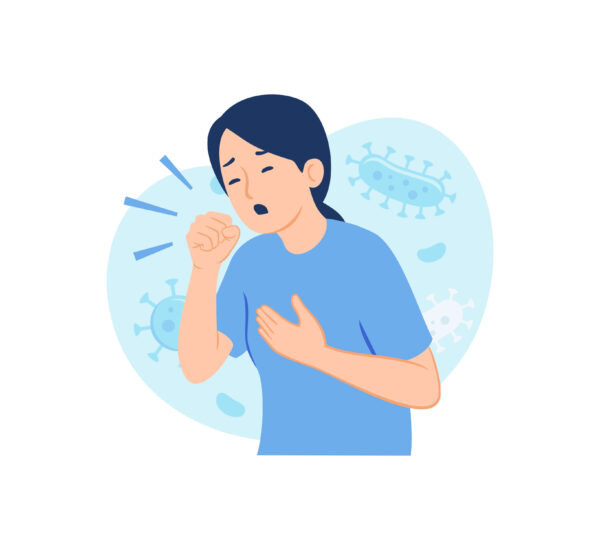Experiencing acute asthma attack or bronchial asthma in acute exacerbation can be very alarming for patients and their loved ones. It can be alarming in a sense that the patient’s health can deteriorate if not addressed immediately. That’s why gaining knowledge on the suitable bronchial asthma in acute exacerbation treatment options is vital. Thus, ensuring to have a concrete knowledge on what to do when an attack occurs
In this blog, we will explore the treatment options for bronchial asthma in acute exacerbations. Discover the role of quick-relief medications and other treatment plans to manage asthma attacks. Let’s begin!
Defining Acute Exacerbation in the Context of Asthma

Acute exacerbations, also known as asthma attacks, are episodes where asthma symptoms worsen or new symptoms occur. These exacerbations can vary in severity, ranging from mild to severe, and can have a significant impact on a person’s daily life. Asthma exacerbations often occur in individuals with poorly controlled or severe asthma. Poor control of asthma can lead to increased inflammation and sensitivity of the airways, making them more prone to exacerbations.
Unfortunately, it is very common to happen as not many people are aware of how to properly manage their condition. Without knowing how to handle asthma in its early symptoms, it can definitely progress to severe cases. Thus, an asthma attack happens.
How to Stop Bronchial Asthma in Acute Exacerbation
In the case of handling asthma exacerbations, patients must expect that their condition can always worsen. Asthma can be triggered by numerous factors, which are mostly around the patient. So, it is best to be aware of how to prevent asthma attacks at all costs. That can happen through a thorough action plan.
It is important for individuals with asthma to have an asthma action plan in place. This plan outlines the steps to take when symptoms worsen, including when to increase medication doses, when to seek medical care, and what to do in case of emergencies.
Take note that while an action plan may involve medications, patients can also practice alternative options for stopping asthma attacks. Bronchial asthma in acute exacerbation treatment may involve breathing exercises, meditation, etc. These steps can help patients to be more relaxed, which can help them be grounded when an attack occurs. Thus, allowing them to practice clearing their airways and breathe easily.
Recognizing the Right Time for Inhaler Use

One of the most known medications that doctors prescribe to patients with asthma is inhaler. This breathing tool is designed to allow the patient to experience quick relief. In that case, it is an effective bronchial asthma in acute exacerbation treatment.
In short, if a patient is having an asthma attack, it is essential to always have this bronchial asthma in acute exacerbation treatment for emergency reasons. That way the patient can avoid worsening their condition.
Types of Inhalers and Their Specific Uses
There are various types of inhalers available for the treatment of bronchial asthma, each with its specific uses and benefits. The choice of inhaler depends on individual preferences, ability to use the device correctly, and the severity of the asthma symptoms. Some common types of inhalers include:
- Short-acting beta-agonists (SABAs): Provide quick relief of clinical symptoms and are used as needed during acute exacerbations. Examples include albuterol and levalbuterol.
- Long-acting beta-agonists (LABAs): Used as maintenance medications to prevent symptoms and reduce the frequency of exacerbations. They are typically used in combination with corticosteroids. Examples include salmeterol and formoterol.
- Inhaled corticosteroids (ICS): Help reduce airway inflammation and are used as maintenance medications to prevent exacerbations. Examples include fluticasone and budesonide.
- Combination inhalers: Contain both a long-acting beta-agonist and an inhaled corticosteroid, providing both symptom relief and inflammation control. Examples include fluticasone/salmeterol and budesonide/formoterol.
It is important for individuals to use their inhalers correctly and consistently to achieve optimal asthma control. Proper inhaler technique, regular cleaning and maintenance of the device, and adherence to the prescribed dosing schedule are essential for effective treatment.
Advanced Bronchial Asthma in Acute Exacerbation Treatment

In addition to inhalers, there are advanced bronchial asthma in acute exacerbation treatment options available for asthmatic patients. These options are typically reserved for individuals with severe attack from asthma or can’t-control asthma who do not respond well to standard therapies.
Advanced bronchial asthma in acute exacerbation treatment options may include:
- Long-acting beta-agonists (LABAs): As mentioned, it may involve the use of corticosteroids, which can reduce the frequency of exacerbations.
- Leukotriene modifiers: These medications help reduce inflammation in the airways and are used as adjunct therapy in individuals with persistent asthma symptoms despite standard treatment.
- Biologic therapies: These medications target specific immune system pathways involved in the development of asthma and can be effective in individuals with severe eosinophilic asthma.
It is important for individuals with severe asthma to work closely with their healthcare provider to determine the most appropriate advanced treatment option based on their specific needs and medical history.
Adverse Effects of Medications for Treating Asthma Exacerbation

While there are several bronchial asthma in acute exacerbation treatment options, there’s still a possibility of experiencing adverse effects. These side effects can involve various parts of the body of the patient. Although, do take note that such side effects are rare to occur. Some of them only happen if there’s contradicting medications or if the patient is allergic.
No matter what the case is, the doctor will possibly explain these effects during the consultation period. So, it is best to listen carefully to the doctor and communicate any concern relating to allergies and other medical records. That way these side effects can be prevented.
Here are some of the possible adverse effect of the mentioned medications above:
- Increased risk of oral thrush
- hoarseness
- bone density loss with long-term use
- possible palpitations
- tremors
- increased heart rate
- headache
If any of these side effects occur, it is best to visit your doctor immediately.
Emergency Care for Asthma Exacerbation

When it comes to severe exacerbations of asthma, it is important to have a prompt medical intervention to prevent complications and ensure proper management of the exacerbation. Emergency cases can occur such as respiratory failure if the condition worsens. That is why emergency care should be considered by visiting an emergency room when needed.
When to Seek Hospital Care
In some cases, individuals with bronchial asthma exacerbation may need to seek hospital care for further management. Hospital care may be necessary if the exacerbation is severe or if certain risk factors are present. Some key indications for seeking hospital care include:
- A persistent increase in heart rate, despite the use of quick-relief medications.
- Exacerbation triggered by environmental exposure to particulate matter, such as smoke or pollution.
- Exacerbation triggered by indoor allergens, such as dust mites, that are difficult to avoid or control.
- A previous history of severe exacerbations requiring hospitalization or intensive care unit (ICU) admission.
- A recurrence of viral respiratory infections
- Difficulty in recognizing asthma symptoms or distinguishing exacerbations from usual symptoms.
- Recent hospitalization or emergency department visit for asthma.
It is important for individuals to be aware of these risk factors and to seek medical care promptly to ensure proper management of their asthma exacerbation.
Emergency Bronchial Asthma in Acute Exacerbation Treatment Process
Once at the emergency room, the doctor will assess the patient’s vitals, which includes the blood pressure, oxygen saturation, respiratory rate, etc. The emergency room team will administer bronchodilators such as albuterol to help open up the airways and improve breathing. They may also give corticosteroids to reduce inflammation in the airways quickly, along with oxygen therapy if needed. Continuous monitoring of the patient’s respiratory status and response to treatment is vital to ensure a successful outcome.
In severe cases where the patient’s condition deteriorates rapidly like respiratory arrest, intubation and mechanical ventilation may be necessary. These tools can help support breathing until the acute exacerbation is under control. It is crucial for healthcare providers to act swiftly and decisively during an asthma
If you or someone you know is experiencing a severe asthma exacerbation, it is important to seek medical help immediately. Emergency care for asthma exacerbation typically involves assessment of lung function, administration of medications to relieve symptoms and reduce airway inflammation, and monitoring of vital signs.
Conclusion
Addressing asthma attacks properly can happen through understanding the various bronchial asthma in acute exacerbation treatment options. These forms of treatment allow the patient to manage their condition better and prevent worsening of the illness. That’s because when it’s too late, the patient can suffer further until deterioration happens, which means emergency care is a must.
If you have asthma, it is important to be vigilant and prepared for what can happen. By staying informed and proactive, you can effectively navigate through asthma episodes and maintain better respiratory health. At the same time, learn to seek help when needed to prevent fatalities.Ensure proper management of asthma exacerbations and improve overall quality of life for individuals with bronchial asthma. Book an online consultation with a pulmonologist to receive the suitable bronchial asthma in acute exacerbation treatment.
Bronchial Asthma Quiz
Test your knowledge about acute exacerbation treatment



